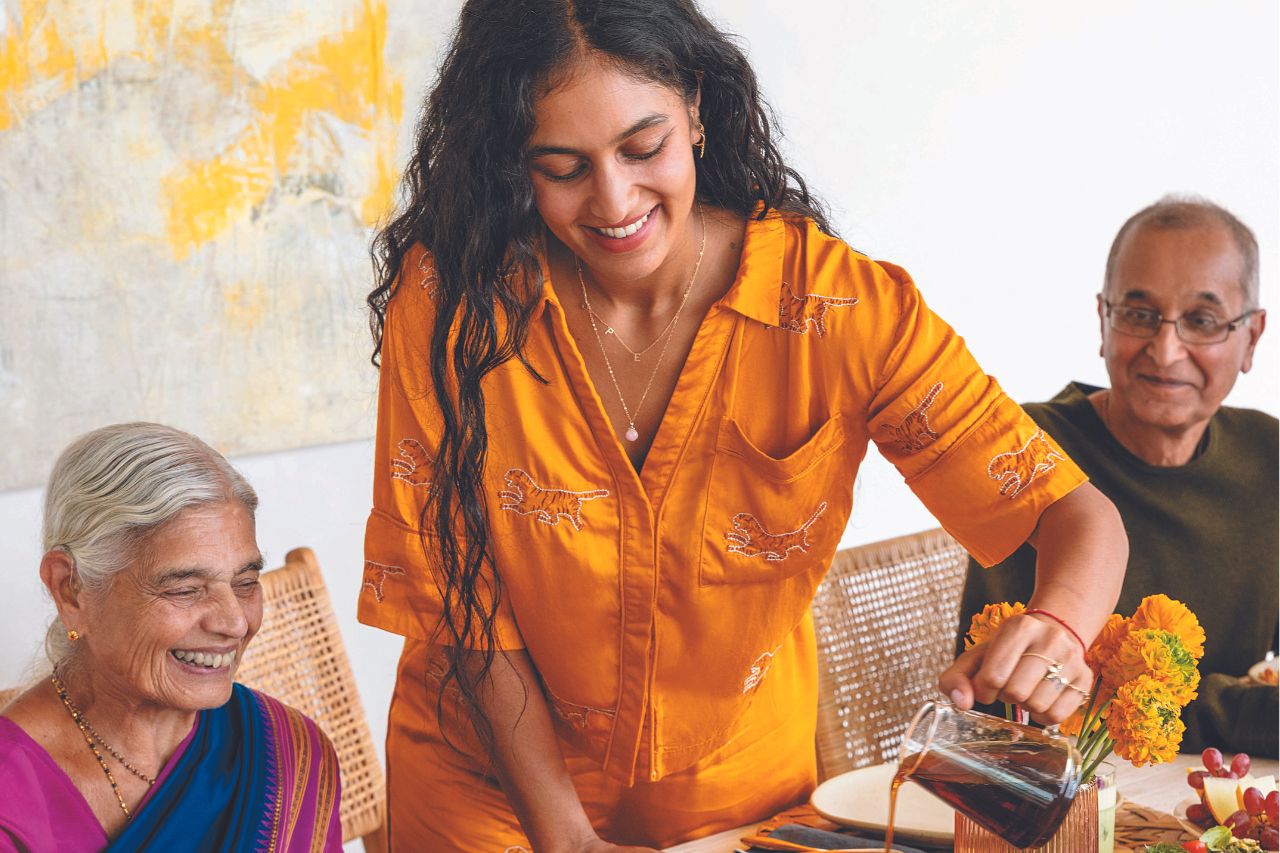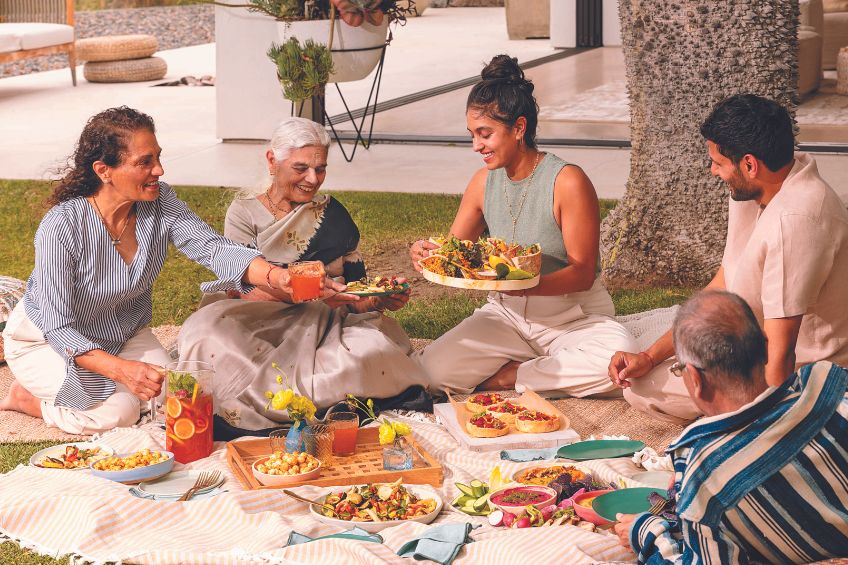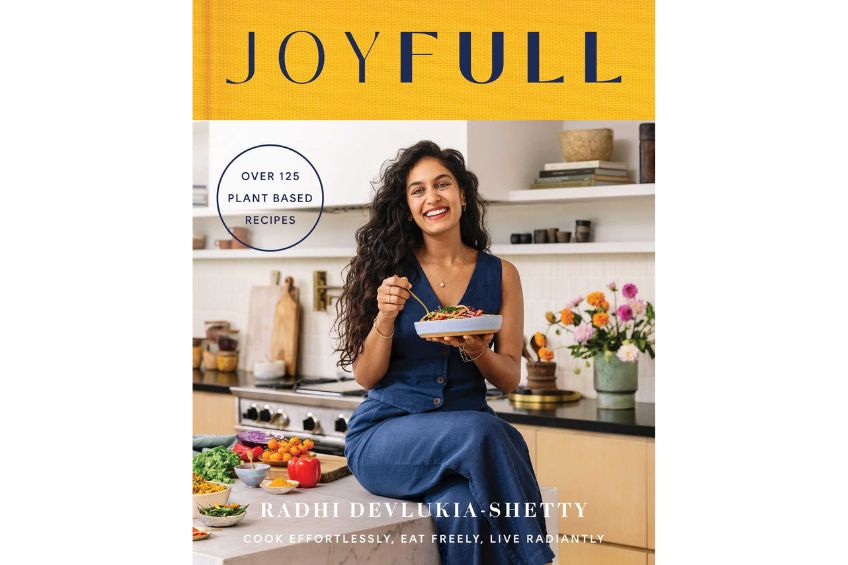
If you’re like the more than 2.2 million Instagram followers, you’re likely already familiar with celeb-approved plant-based cook and recipe developer Radhi Devlukia-Shetty. You’d know how her playful and heart-felt video delivery carries through to her good-for-you-and-the-planet recipes — now encapsulated in her first cookbook, JOYFULL: Cook Effortlessly, Eat Freely, Live Radiantly. The trained dietitian, nutritionist and Ayurvedic student approaches a passion for holistic well-being anyone can tap into, leaning into everything from smoothies designed to bring more vitality into your body and day (Iron Beet-Down) to Moon Milks that help you wind down, to familial favourite mains (Momma’s Rich and Creamy Three-Bean Red Curry and Baa’s Wedding Daal). And of course, there are desserts.
Radhi also lays the groundwork for understanding how she mindfully chooses her ingredients and how each works to heal and support your overall well-being. We caught up with Radhi to dive deeper into JOYFULL, what fuels her and why she avoids cooking with garlic (and onions). Read on for the full interview.
Radhi’s cookbook is now available on Amazon and in bookstores everywhere.
In JOYFULL, you approach food in a holistic 360-degree way. How did you come to this view?
So I grew up in an Indian family where my mom was the most magnificent cook. She worked a full-time job, but she made sure that we had amazing breakfasts, lunches and dinners every single day. And that in itself was such a beautiful inspiration for me growing up. She would experiment with different flavours from our Indian background. There was always such emphasis on spices. I also grew up a vegetarian. And so everything was based around vegetables and lentils, beans and pulses; it was just so colourful, vibrant and always so delicious. So, she was probably my first inspiration.
Then after that, my mom actually recommended that I get a nutrition degree. All I knew at that time was that I loved eating. I had a zest for watching my mom cook and helping her. So I did my nutrition and dietetics degree. I learned so much about the breakdown of food, and how it affects your body. It was such a good foundation for me to see the Western way of approaching nutrition.
Then I moved to New York, which I had to do because my husband [author and podcast host Jay Shetty] got a job [there]. At the time, I actually couldn’t work so I decided to throw myself into study. So I studied Ayurveda, I did my yoga teacher training there, and it brought me a whole new perspective [on] how I grew up and how my mom used spices to heal me.
[I learned] just how easy it is to nourish your body through what nature provides us with. How to actually get nutrients that benefit not just our body, but how food can impact our consciousness, mind and joy in life. The book [JOYFULL] is not an Ayurvedic book, but I have included the basic principles that I feel everybody, no matter where you’re from or what you do, can really benefit from.
Related: Make These Immunity Cubes for Cold and Flu Season

Alanna Hale
You already touched on this a little bit, but you also weave in how the role of your family has had on the recipes in JOYFULL. Can you say a bit more about this?
You know, there’s something about food. And I talk about this in the book — that it’s cooked with so much love. There’s something about [a] mother’s cooking. But it also comes down to so much deep intention while you’re cooking, right? When I became vegan, there was nothing I couldn’t eat because she would create and experiment with ingredients to make sure that we weren’t missing out on anything.
There’s such a beauty watching her and it made me realize, you know, nothing was ever a ‘no.’ There was always a desire to keep experimenting, even though she already knew so much. I think to always be a student in the kitchen is a beautiful way to keep your food exciting, fun and vibrant.
What recipes are you most excited about in your cookbook? Which is your favourite?
There are so many different ones for different reasons and different seasons. The one I’m really happy I brought into the book for sentimental value is my grandma Baa’s [Wedding] Daal, which she’s been making since she started cooking when she was 13 years old. It’s a sweet and sour lentil dish and a lot runnier than normal curries or lentils, but it’s packed with so much flavour.
Related: Make This Comforting Daal Chawal
What are your top three favourite ingredients to work with?
Every single dish has some sort of spice in it because spices were a really important part of creating the book. I use cumin a lot, and I think that’s an easy one because it’s used in so many different cuisines. It’s used in Indian food, Mexican food [and] Moroccan food. So it’s something that you may even have in your cupboard already.
One of the stronger ones that I really like is mustard seed. It definitely has a powerful taste, but it adds so much if you put it into oil; it’s really vibrant.
The third one is one that probably people wouldn’t know much about but it’s one that I use in my book a lot, and it’s called asafetida or hing. [You can use it in place of] or on top of onion and garlic, but it’s got so many health benefits. You need like an eighth of a teaspoon. That’s one that I’m excited to introduce people to because it adds so much. It has a very similar taste and flavour profile to onion or garlic in that intensity but it’s much kinder to your gut.

JOYFULL: Cook Effortlessly, Eat Freely, Live Radiantly, $30, via Amazon
Those who may not be familiar with your recipes may be surprised to learn that you avoid onion and garlic. Can you say a bit more about this choice?
Yeah, for multiple reasons. When I studied Ayurveda, I found that every single food carries energy in how it affects the body. So the medicinal qualities of onion and garlic are so potent that they were used as medicine back in the day. But the problem is that we’ve taken these powerful ingredients and we’re using them every single day in every single meal — so now it’s gone the opposite way. It’s actually causing inflammation in our body.
But the main reason was because I believe that there are so many other flavours in the world and so many spices that we can use, it almost feels like a bit of a cop out because it’s easy to overpower [other ingredients] with onion and garlic. But if you can learn how to cook using herbs and spices, you’ll notice you can make so many more flavours — you don’t even end up needing [these two] in a lot of dishes. So it’s actually [shown] me how to become a better cook at home because I get to experiment with more flavours than just one or two that become the base of everything.
You also avoid alcohol. What do you turn to in place of alcoholic cocktails when the occasion calls for something a little out of the ordinary?
A lot of my friends did drink and I wanted to create a space where coming over on a Friday night, they still had something that they can pour into a nice glass. So I just created a really simple pomegranate spritz that they could have in [their] wine glass. [You can have that] feeling of having a fancy drink, but without the hangover the next day. I started experimenting with different drinks, different tonics and non-alcoholic drinks. I’ve got a couple [of recipes] in my book, but I think there are so many different options that you can create without alcohol. I try different new things out with different glasses and just make it feel a bit fancy.
Related: Sleepy Time Mocktail
Having gone through the transition yourself, what advice do you have for someone adopting a more plant-based diet and lifestyle?
I’d say one of the best things to do is every month or every week — whatever feels most doable — write down a list of vegetables you want to try out and base your meal around.
So I say trying out food and being open to experimenting is going to be key to having a meal plan. You can get stuck with so many foods that are plant-based and vegan that aren’t actually that good for you. More than the substitutes that exist, try out vegetables first, maybe pick a theme that you want to base your meals around in the week and try out different ways of cooking [the key ingredients], and then create your weekly meal plans from the ones that you love.
I think we’re used to going in all or nothing, and I think taking baby steps is a way towards making a change that you can stick with.
Read More: Miso Ginger Carrot and Sweet Potato Soup for Coughs and Sore Throats
What key message do you want your readers to take away from JOYFULL?
The whole point of this book is to bring a little bit more joy into your life. There are obviously the recipes, but then there are also so many health, wellness and mindfulness tips that not just impact the way that you’re eating, but also how you live throughout the day. I hope that the food brings you joy, but also that these incredible practices that have changed my life also have an impact [on] other people’s lives.
This interview has been edited and condensed.
All products featured on Flavour Network are independently selected by our editors. For more products handpicked by our editorial team, visit Flavour Network's Amazon storefront. However, when you buy through links in this article or on our storefront, we earn an affiliate commission.
